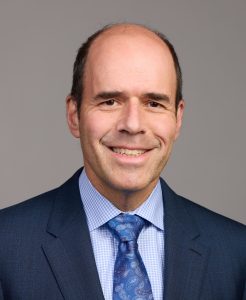Having “survived,” as he jokingly said, his first ABR board meeting last month, Kenneth Rosenzweig, MD, is eager to start work as a Trustee.
New Trustees spend initial meetings getting accustomed to their duties. Their status as board members begins at the end of that week. Dr. Rosenzweig used the time to gain his footing for the new role.
“The board meeting was great,” he said. “It was good to start getting familiar with the process and see what a lot of the issues are going forward.”

An ABR volunteer since 2002, Dr. Rosenzweig has served as a question writer and oral examiner, a traditional path for aspiring board members. He was named as a Trustee this past May after an application process.
“It’s something I knew about and had been interested in,” he said. “I think the timing of the needs of the board worked out this time. It’s been a long dance, but we finally got together.”
Dr. Rosenzweig, who is chair of the department of radiation oncology at Mount Sinai Health System and a professor in the department of radiation oncology at the Icahn School of Medicine at Mount Sinai in New York, became interested in ABR exams while going through the Initial Certification process.
As was the case for most of his peers, his path to certification went through Louisville, Kentucky, for a high stakes round of oral exams. Even though everyone was on edge, Dr. Rosenzweig gained an appreciation for the process.
“It’s a very stressful time for examinees, and, of course, I was stressed out myself,” he said. “But I thought it was the most wonderful process, because senior doctors from around the country were coming together to make sure I knew enough to be considered part of the profession.”
His interest in the operation went beyond that of some examinees. Like many eventual ABR volunteers, he was already wondering what went into creating and delivering exams.
“You always want to know how the sausage is made,” Dr. Rosenzweig said. “I appreciate and understand that the nature of examinees is to think that there’s some kind of game or tricks behind the scenes. I never thought that, but you still want to know what it’s really like.”
He eventually found out first-hand when he was chosen as an oral examiner. Dr. Rosenzweig was a bit surprised to discover that examiners are given some freedom as they work through cases with examinees.
“We got a lot of pointers, but it wasn’t a secret society where we learned the secret handshake and the real truth on how to do it,” he said. “Cases are somewhat standardized, but we are able to have our own style.”
Part of the job is remembering what it was like to be a nervous examinee.
“I always wanted to put candidates at ease,” Dr. Rosenzweig said. “This is not a personality test. It’s not a job interview. Just tell me how you do things. We want to make sure you’re doing it safely and correctly.”
When he was named as a Trustee this past May, he was writing and reviewing questions as chair of the lung/sarcoma section of the Radiation Oncology Qualifying Exam. His and other ABR committees serve as arbiters of what successful candidates should know to meet Initial Certification requirements. Minutiae isn’t welcomed.
“We don’t want to fall into the trap of saying, ‘What was the five-year survival of patients who received radiation on Study X from 2021?’” he said. “There’s definitely a clear answer, but knowing that it was 52% instead of 62% I don’t think conveys that you have an understanding of how to treat patients.”
ABR Associate Executive Director for Radiation Oncology Michael Yunes, MD, has worked with Dr. Rosenzweig on volunteer committees and appreciates the many qualities his colleague will contribute as a Trustee.
“His wit brings a smile and a frequently needed touch of humor to complicated deliberations,” Dr. Yunes said. “It is a pleasure to have him join the radiation oncology Trustees, rounding out a spectacular group of people who enthusiastically embrace their positions in our field at large, ensuring that future radiation oncologists maintain the highest standards.”
Dr. Rosenzweig has been a volunteer in many capacities, including as president of the American Radium Society, chair of the scientific committee of ASTRO’s annual meeting, and vice-chair of the Radiation Oncology Residency Review Committee of the American College of Graduate Medical Education.
Because it involves patient safety through a certification process, he sees his ABR work as distinct from other volunteer responsibilities.
“There are other societies and mechanisms where someone can do tremendous work in giving back,” Dr. Rosenzweig said. “But the ABR is one that we are all familiar with and is pretty distinct in what needs to get done.”


